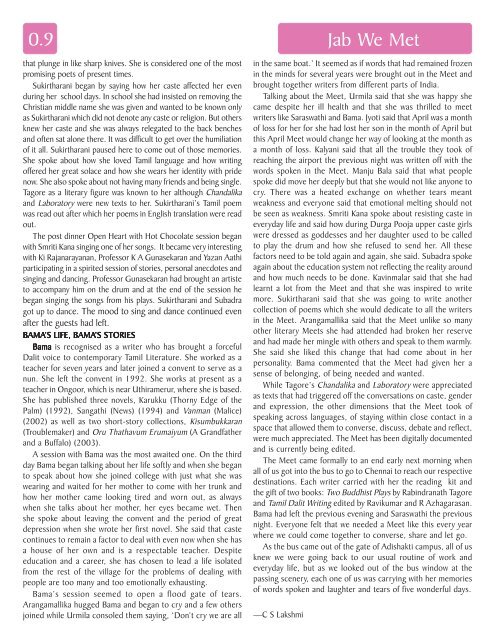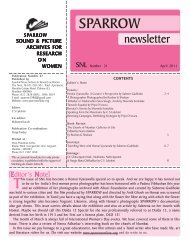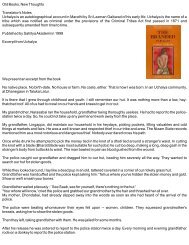SNL25-26_final for print.pmd - sparrow
SNL25-26_final for print.pmd - sparrow
SNL25-26_final for print.pmd - sparrow
- No tags were found...
You also want an ePaper? Increase the reach of your titles
YUMPU automatically turns print PDFs into web optimized ePapers that Google loves.
0.9 Jab We Metthat plunge in like sharp knives. She is considered one of the mostpromising poets of present times.Sukirtharani began by saying how her caste affected her evenduring her school days. In school she had insisted on removing theChristian middle name she was given and wanted to be known onlyas Sukirtharani which did not denote any caste or religion. But othersknew her caste and she was always relegated to the back benchesand often sat alone there. It was difficult to get over the humiliationof it all. Sukirtharani paused here to come out of those memories.She spoke about how she loved Tamil language and how writingoffered her great solace and how she wears her identity with pridenow. She also spoke about not having many friends and being single.Tagore as a literary figure was known to her although Chandalikaand Laboratory were new texts to her. Sukirtharani’s Tamil poemwas read out after which her poems in English translation were readout.The post dinner Open Heart with Hot Chocolate session beganwith Smriti Kana singing one of her songs. It became very interestingwith Ki Rajanarayanan, Professor K A Gunasekaran and Yazan Aathiparticipating in a spirited session of stories, personal anecdotes andsinging and dancing. Professor Gunasekaran had brought an artisteto accompany him on the drum and at the end of the session hebegan singing the songs from his plays. Sukirtharani and Subadragot up to dance. The mood to sing and dance continued evenafter the guests had left.BAMA’S LIFE, BAMA’S STORIESBama is recognised as a writer who has brought a <strong>for</strong>cefulDalit voice to contemporary Tamil Literature. She worked as ateacher <strong>for</strong> seven years and later joined a convent to serve as anun. She left the convent in 1992. She works at present as ateacher in Ongoor, which is near Uthiramerur, where she is based.She has published three novels, Karukku (Thorny Edge of thePalm) (1992), Sangathi (News) (1994) and Vanman (Malice)(2002) as well as two short-story collections, Kisumbukkaran(Troublemaker) and Oru Thathavum Erumaiyum (A Grandfatherand a Buffalo) (2003).A session with Bama was the most awaited one. On the thirdday Bama began talking about her life softly and when she beganto speak about how she joined college with just what she waswearing and waited <strong>for</strong> her mother to come with her trunk andhow her mother came looking tired and worn out, as alwayswhen she talks about her mother, her eyes became wet. Thenshe spoke about leaving the convent and the period of greatdepression when she wrote her first novel. She said that castecontinues to remain a factor to deal with even now when she hasa house of her own and is a respectable teacher. Despiteeducation and a career, she has chosen to lead a life isolatedfrom the rest of the village <strong>for</strong> the problems of dealing withpeople are too many and too emotionally exhausting.Bama’s session seemed to open a flood gate of tears.Arangamallika hugged Bama and began to cry and a few othersjoined while Urmila consoled them saying, ‘Don’t cry we are allin the same boat.’ It seemed as if words that had remained frozenin the minds <strong>for</strong> several years were brought out in the Meet andbrought together writers from different parts of India.Talking about the Meet, Urmila said that she was happy shecame despite her ill health and that she was thrilled to meetwriters like Saraswathi and Bama. Jyoti said that April was a monthof loss <strong>for</strong> her <strong>for</strong> she had lost her son in the month of April butthis April Meet would change her way of looking at the month asa month of loss. Kalyani said that all the trouble they took ofreaching the airport the previous night was written off with thewords spoken in the Meet. Manju Bala said that what peoplespoke did move her deeply but that she would not like anyone tocry. There was a heated exchange on whether tears meantweakness and everyone said that emotional melting should notbe seen as weakness. Smriti Kana spoke about resisting caste ineveryday life and said how during Durga Pooja upper caste girlswere dressed as goddesses and her daughter used to be calledto play the drum and how she refused to send her. All thesefactors need to be told again and again, she said. Subadra spokeagain about the education system not reflecting the reality aroundand how much needs to be done. Kavinmalar said that she hadlearnt a lot from the Meet and that she was inspired to writemore. Sukirtharani said that she was going to write anothercollection of poems which she would dedicate to all the writersin the Meet. Arangamallika said that the Meet unlike so manyother literary Meets she had attended had broken her reserveand had made her mingle with others and speak to them warmly.She said she liked this change that had come about in herpersonality. Bama commented that the Meet had given her asense of belonging, of being needed and wanted.While Tagore’s Chandalika and Laboratory were appreciatedas texts that had triggered off the conversations on caste, genderand expression, the other dimensions that the Meet took ofspeaking across languages, of staying within close contact in aspace that allowed them to converse, discuss, debate and reflect,were much appreciated. The Meet has been digitally documentedand is currently being edited.The Meet came <strong>for</strong>mally to an end early next morning whenall of us got into the bus to go to Chennai to reach our respectivedestinations. Each writer carried with her the reading kit andthe gift of two books: Two Buddhist Plays by Rabindranath Tagoreand Tamil Dalit Writing edited by Ravikumar and R Azhagarasan.Bama had left the previous evening and Saraswathi the previousnight. Everyone felt that we needed a Meet like this every yearwhere we could come together to converse, share and let go.As the bus came out of the gate of Adishakti campus, all of usknew we were going back to our usual routine of work andeveryday life, but as we looked out of the bus window at thepassing scenery, each one of us was carrying with her memoriesof words spoken and laughter and tears of five wonderful days.—C S Lakshmi




